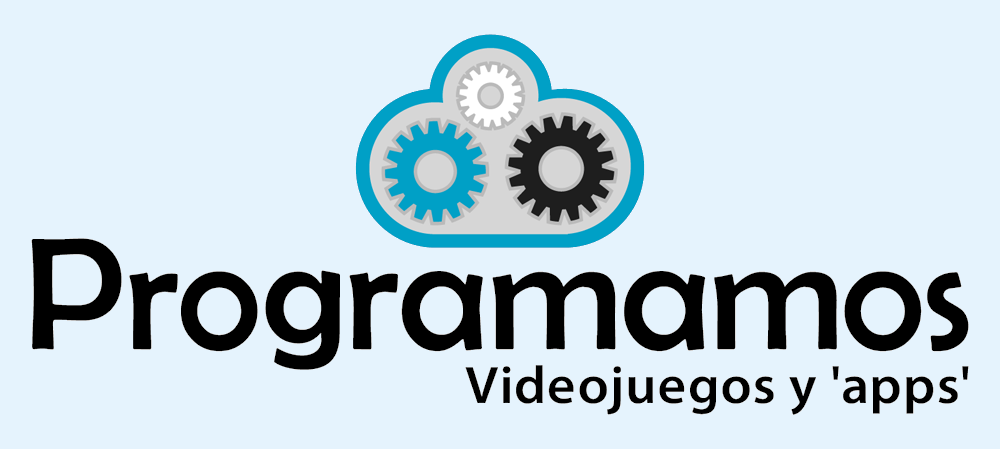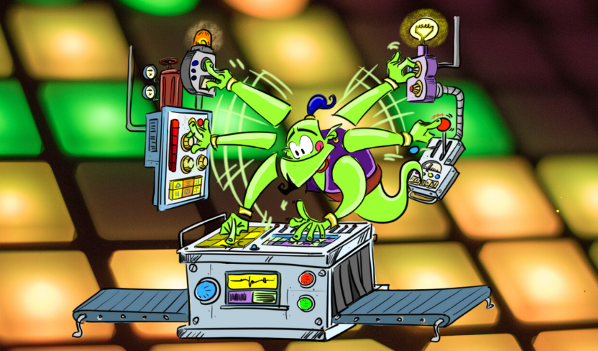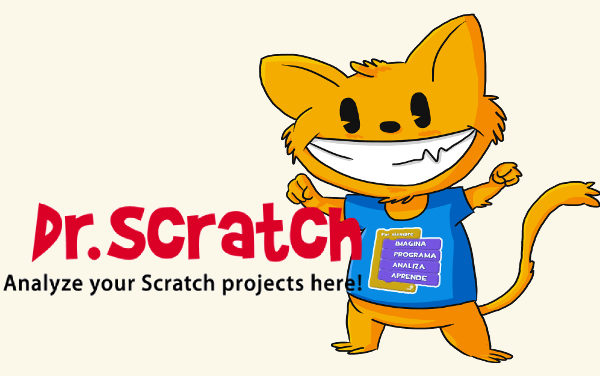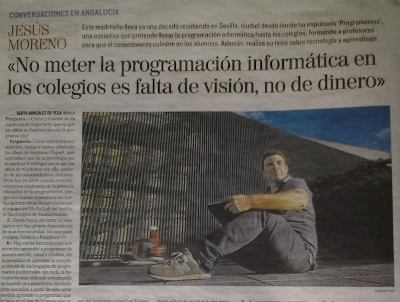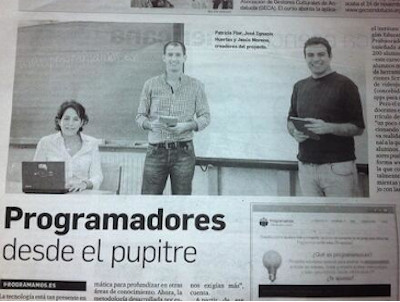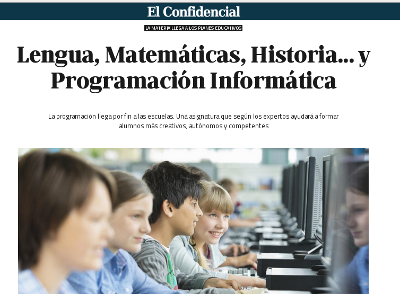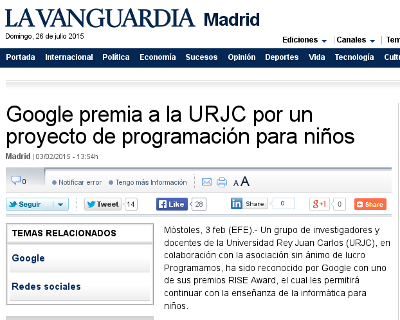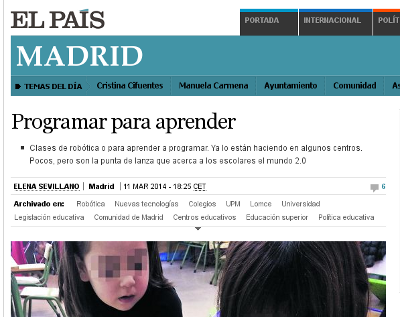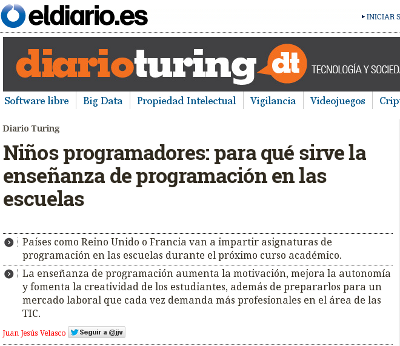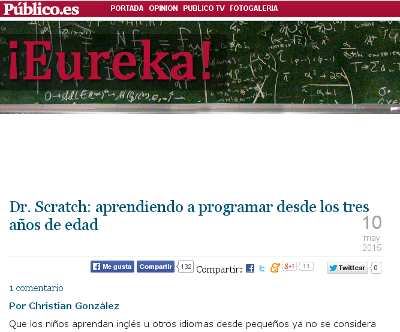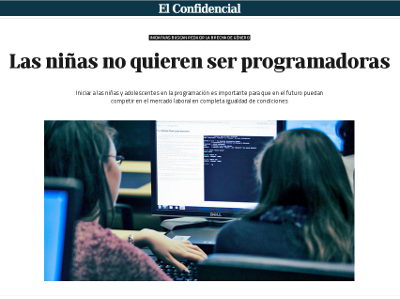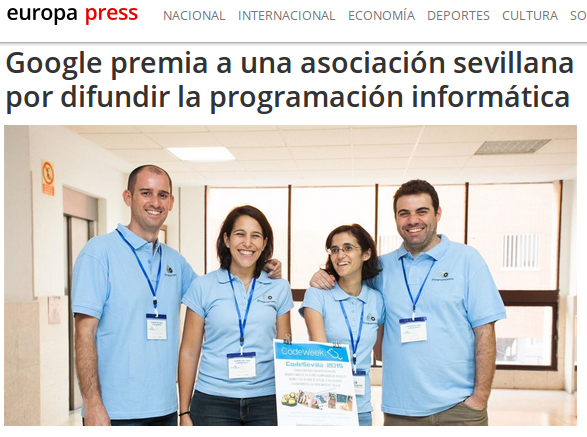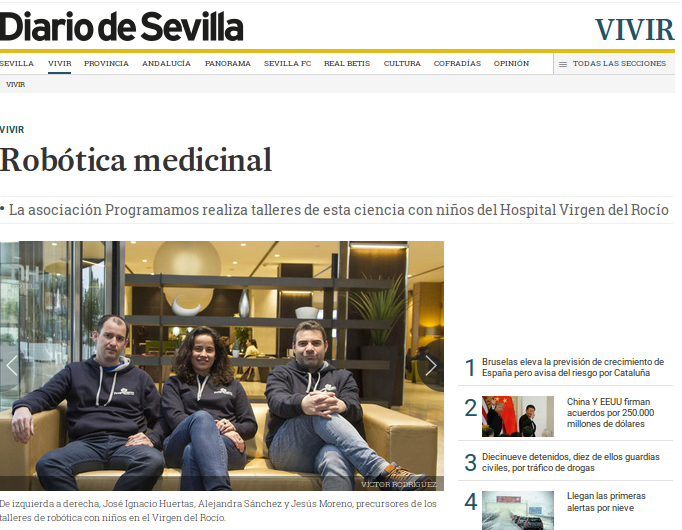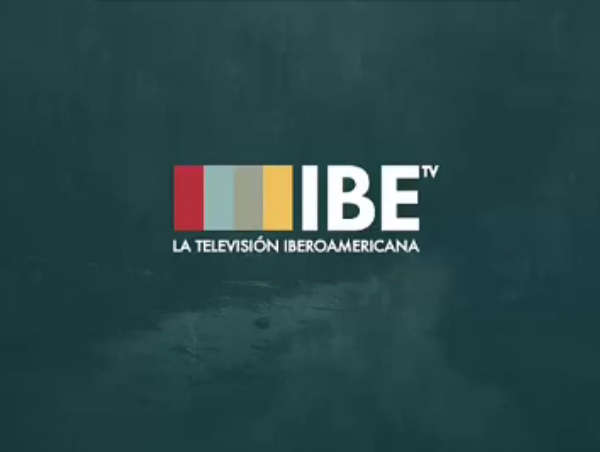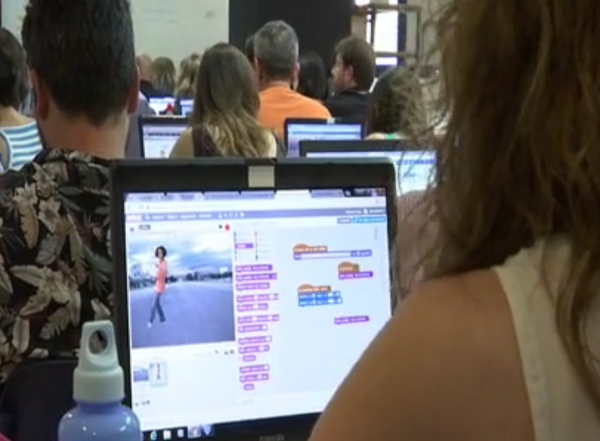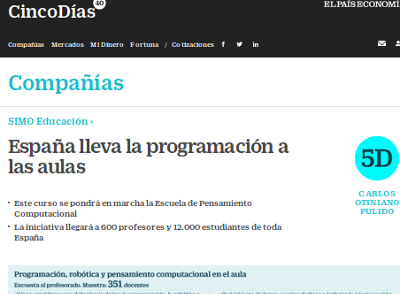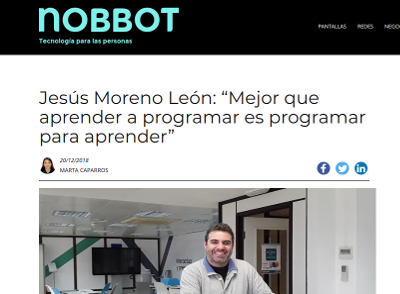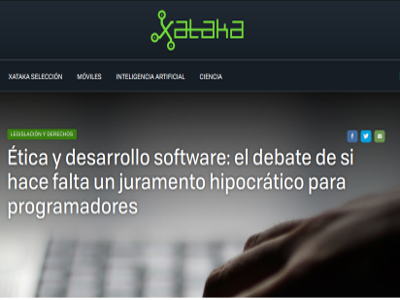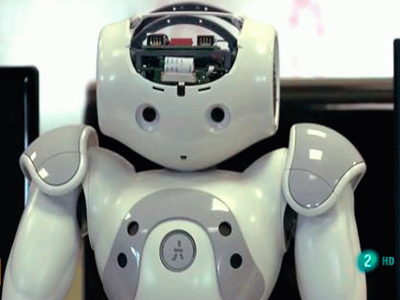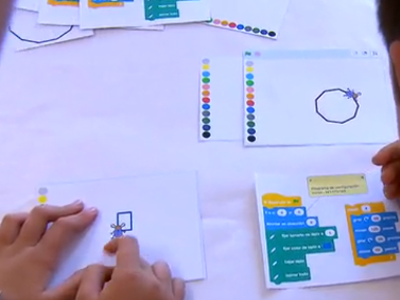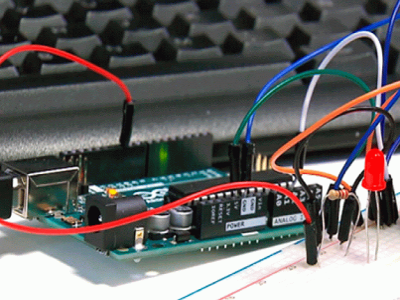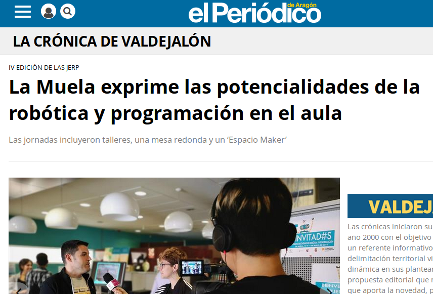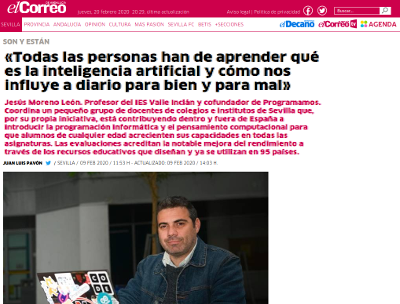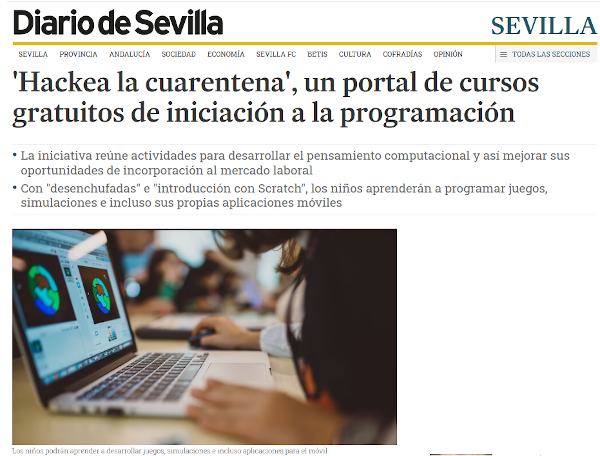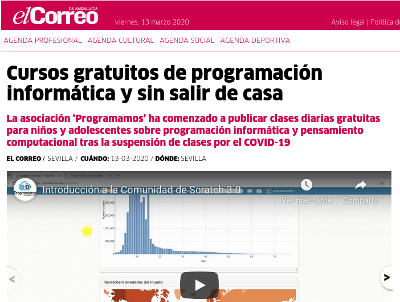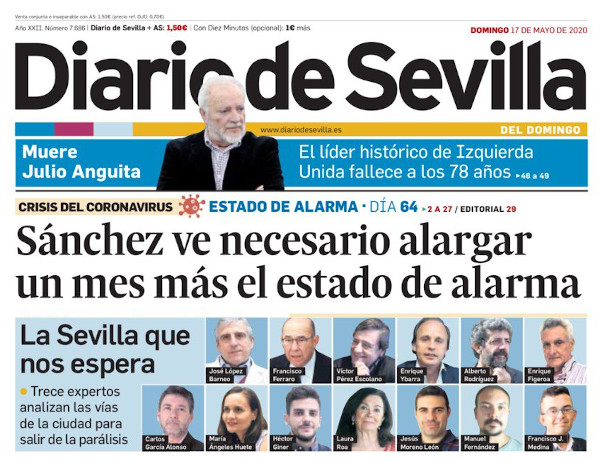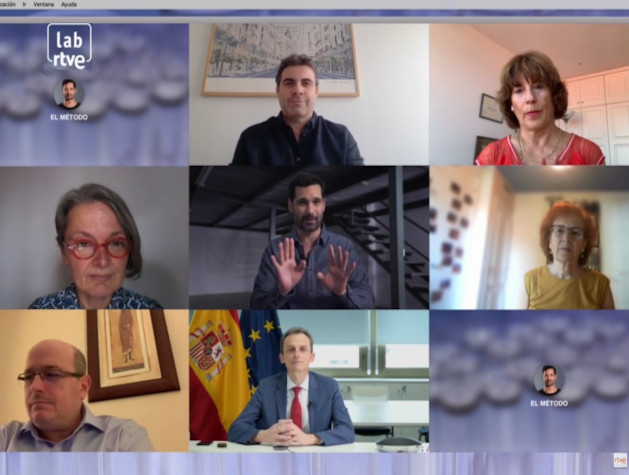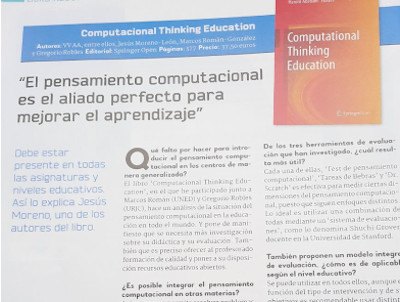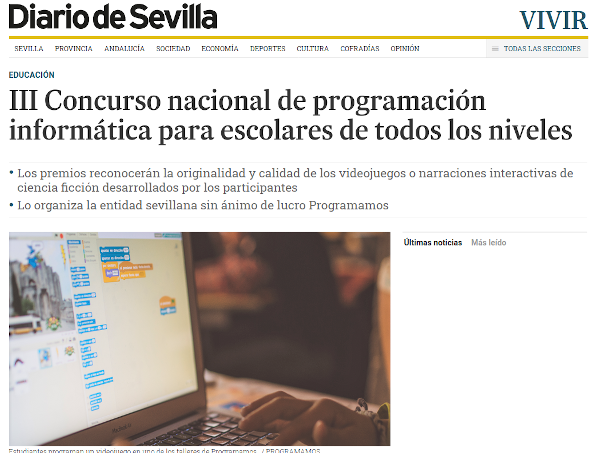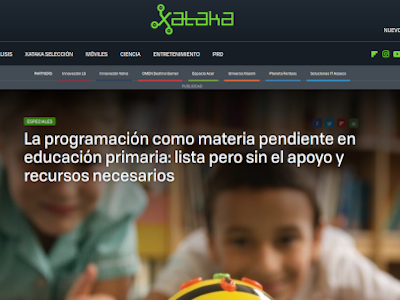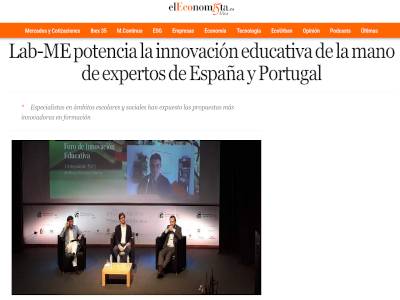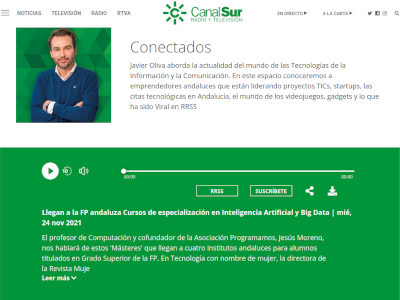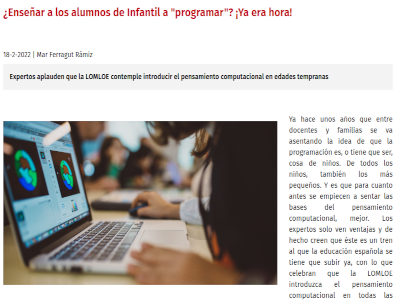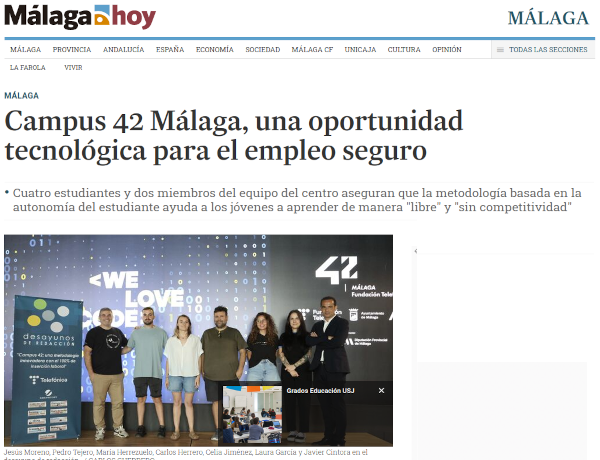Jesús Moreno León
jmorenol@us.es
After more than a decade as a Computer Science teacher, I decided to explore different paths of the educational landscape. For a few years I worked at different universities to perform research on the learning of this discipline, led non-profit projects of informal education, participated in international working groups and commissions, managed large-scale projects at the Ministry of Education, and led the strategy team supporting the four 42 Campus that Fundación Telefónica manages in Spain, among other initiatives. With a more global vision, I am back to the classroom and the lab at University of Seville.
Projects & initiatives
Programamos is a non-profit organization that promotes the development of computational thinking skills from early ages in all educational levels, from kindergarten to university. Programamos offers free materials for educators as well as trainings and workshops on programming and robotics. Being a non-profit organization, the social component of Programamos is very important. Therefore, they organize free activities for socially disadvantaged kids. A sample of such actions is Healing with code, a project in which Programamos has collaborated with a hospital for running two workshops a week for an entire year for hospitalized kids.
LearningML is an educational platform for teaching and learning about one of the most widely used artificial intelligence techniques today: machine learning. The tool greatly facilitates the construction of machine learning models, since it focuses on the fundamentals and hides the most complex aspects. In three simple steps you can obtain a machine learning model both from text or images sets. LarningML also includes a programming environment, based on Scratch, where you can program applications that make use of your machine learning models. LearningML is developed by Juan David Rodríguez García and the KGBL3 research group.
Dr. Scratch is a web application that enables teachers and students to automatically analyze projects created with Scratch, the most used programming language in primary and secondary education. The tool provides feedback aiming to support learners to improve their code and develop their computational thinking skills. Dr. Scratch is used worldwide by students, educators, goverments, researchers and non-prift organizations to evaluate and assess programming interventions. The tool is developed by the KGBL3 research group
Research publications
- Marcos Jiménez, María Zapata-Cáceres, Marcos Román-González, Gregorio Robles, Jesús Moreno-León & Estefanía Martín-Barroso. Computational Concepts and their Assessment in Preschool Students: An Empirical Study. Journal of Science Education and Technology , 33, 998–1020. 2024. [ Open access article ]
- Jesus Moreno-León, Margarita Vasco-González, Marcos Román-González, Gregorio Robles. Investigating the Impact of Programming Activities on Computational Thinking and AI Literacy in Spanish Schools. In Proceedings of the 19th WiPSCE Conference on Primary and Secondary Computing Education Research (WiPSCE '24), ACM, Article 7, 1–10. 2024. [ Open access article ]
-
Marcos Román-González, Jesús Moreno-León and Gregorio Robles.
Toward a Theory (and Practice) of Multiple Computational Thinkings.
In
Computational Thinking Education in K–12: Artificial Intelligence Literacy and Physical Computing , pages 71--102. MIT Press, 2022.
[ Open
access chapter ]
- Jesús Moreno-León, Cristian Chushig and Gregorio Robles. Modeling At School – On the Benefits and Skill Development of the Use of Modeling Diagrams at School. 2022 IEEE Global Engineering Education Conference (EDUCON), 2022, pp. 451-457. [ DOI | Draft copy ]
- Juan David Rodríguez-García, Jesús Moreno-León, Marcos Román-González and Gregorio Robles. Evaluation of an Online Intervention to Teach Artificial Intelligence with LearningML to 10-16-Year-Old Students. SIGCSE '21: Proceedings of the 52nd ACM Technical Symposium on Computer Science Education, pages 177–183, 2021. [ bib | DOI | Draft copy ]
- Jesús Moreno-León, Marcos Román-González, Ramón García and Gregorio Robles. Coding to learn Mathematics in 5th grade: Implementation of the ScratchMaths project in Spain. RED. Revista de Educación a Distancia, 21(68). [ DOI | Draft copy ]
- Jesennia Cardenas-Cobo, Amilkar Puris, Pavel Novoa-Hernandez, Agueda Parra-Jimenez, Jesús Moreno-León and David Benavides. Using Scratch to Improve Learning Programming in College Students: A Positive Experience from a Non-WEIRD Country. Electronics 2021, 10, 1180. [ DOI ]
- Juan David Rodríguez-García, Jesús Moreno-León, Marcos Román-González and Gregorio Robles. LearningML: A Tool to Foster Computational Thinking Skills Through Practical Artificial Intelligence Projects. Revista De Educación a Distancia(63), 2020. [ bib | DOI | Draft copy ]
- Jesús Moreno-León, Gregorio Robles, and Marcos Román-González. Towards data-driven learning paths to develop computational thinking with Scratch. IEEE Transactions on Emerging Topics in Computing, vol. 8, no. 1, pp. 193-205, 1 Jan.-March 2020. [ bib | DOI | Draft copy ]
- Jesús Moreno-León, Gregorio Robles, Marcos Román-González and Juan David Rodríguez-García. Not the same: a text network analysis on computational thinking definitions to study its relationship with computer programming. Revista Interuniversitaria De Investigación En Tecnología Educativa, (7), 2019. [ bib | DOI | Draft copy ]
- Juan David Rodríguez-García, Jesús Moreno-León, Marcos Román-González and Gregorio Robles. Developing Computational Thinking at School with Machine Learning: An exploration. In 2019 International Symposium on Computers in Education (SIIE), Tomar, Portugal, 2019, pp. 1-6. [ bib | DOI | Draft copy ]
- Marcos Román-González, Jesús Moreno-León and Gregorio Robles. Combining Assessment Tools for a Comprehensive Evaluation of Computational Thinking Interventions. In Computational Thinking Education, pages 69--78, 2019. [ bib | Open access chapter ]
- Marcos Román-González, Juan-Carlos Párez González, Jesús Moreno-León and Gregorio Robles. Can computational talent be detected? Predictive validity of the Computational Thinking Test International Journal of Child-Computer Interaction, 18, pages 47--58, 2018. [ bib | DOI ]
- Jesús Moreno-León, Marcos Román-González and Gregorio Robles. On computational thinking as a universal skill: A review of the latest research on this ability. In IEEE Global Engineering Education Conference (EDUCON), Tenerife, 2018, pp. 1684-1689. [ bib | DOI | Draft copy ]
- Marcos Román-González, Juan-Carlos Párez-González, Jesús Moreno-León, and Gregorio Robles. Extending the nomological network of computational thinking with non-cognitive factors. Computers in Human Behavior, 80:441--459, 2018. [ bib | DOI ]
- Jesús Moreno-León, Marcos Román-González, Casper Harteveld, and Gregorio Robles. On the automatic assessment of computational thinking skills: A comparison with human experts. In Proceedings of the 2017 CHI Conference Extended Abstracts on Human Factors in Computing Systems, CHI EA '17, pages 2788--2795, New York, NY, USA, 2017. ACM. [ bib | DOI | Draft copy ]
- Marcos Román-González, Jesús Moreno-León, and Gregorio Robles. Complementary tools for computational thinking assessment. In CTE 2017: International Conference on Computational Thinking Education 2017, pages 154--159, July 2017. [ bib | Draft copy ]
- Efthimia Aivaloglou, Felienne Hermans, Jesús Moreno-León, and Gregorio Robles. A dataset of scratch programs: scraped, shaped and scored. In Proceedings of the 14th International Conference on Mining Software Repositories, pages 511--514. IEEE Press, 2017. [ bib | Draft copy ]
- Christian P. Brackmann, Marcos Román-González, Gregorio Robles, Jesús Moreno-León, Ana Casali and Dante Barone. Development of Computational Thinking Skills through Unplugged Activities in Primary School. In Proceedings of the 12th Workshop on Primary and Secondary Computing Education, pages 65--72, ACM, 2017. [ bib | DOI | Draft copy ]
- Gregorio Robles, Jesús Moreno-León, Efthimia Aivaloglou, and Felienne Hermans. Software clones in scratch projects: On the presence of copy-and-paste in computational thinking learning. In Software Clones (IWSC), 2017 IEEE 11th International Workshop on, pages 1--7. IEEE, 2017. [ bib | Draft copy ]
- Jesús Moreno-León, Gregorio Robles, and Marcos Román-González. Examining the relationship between socialization and improved software development skills in the Scratch code learning environment. J. UCS, 22(12):1533--1557, 2016. [ bib | Draft copy ]
- Jesús Moreno-León, Gregorio Robles, and Marcos Román-González. Code to learn: Where does it belong in the k-12 curriculum? Journal of Information Technology Education: Research, 15:283--303, 2016. [ bib | Draft copy ]
- Marcos Román-González, Juan-Carlos Pérez-González, Jesús Moreno-León, and Gregorio Robles. Does computational thinking correlate with personality?: the non-cognitive side of computational thinking. In Proceedings of the Fourth International Conference on Technological Ecosystems for Enhancing Multiculturality, pages 51--58. ACM, 2016. [ bib | Draft copy ]
- Jesús Moreno-León and Gregorio Robles. Code to learn with scratch? A systematic literature review. In Global Engineering Education Conference (EDUCON), 2016 IEEE, pages 150--156. IEEE, 2016. [ bib | Draft copy ]
- Jesús Moreno-León, Gregorio Robles, and Marcos Román-González. Comparing computational thinking development assessment scores with software complexity metrics. In 2016 IEEE Global Engineering Education Conference (EDUCON), pages 1040--1045, April 2016. [ bib | DOI | Draft copy ]
- Jesús Moreno-León, Gregorio Robles, and Marcos Román-González. How social are Scratch learners? A comprehensive analysis of the Scratch platform for social interactions. In FLOSS Education and Computational Thinking Workshop. 12th International Conference on Open Source Systems, pages 19--26, 2016. [ bib | Draft copy ]
- Jesús Moreno-León, Gregorio Robles, and Marcos Román-González. Dr. scratch: Automatic analysis of scratch projects to assess and foster computational thinking. RED. Revista de Educación a Distancia, (46):1--23, 2015. [ bib | Draft copy ]
- Jesús Moreno-León and Gregorio Robles. Dr. scratch: A web tool to automatically evaluate scratch projects. In Proceedings of the workshop in primary and secondary computing education, pages 132--133. ACM, 2015. [ bib | Draft copy ]
- Luis Alberto Calao, Jesús Moreno-León, Heidy Ester Correa, and Gregorio Robles. Developing mathematical thinking with Scratch: An experiment with 6th grade students. In Design for Teaching and Learning in a Networked World, pages 17--27. Springer, 2015. [ bib | Draft copy ]
- Jesús Moreno-León and Gregorio Robles. Computer programming as an educational tool in the English classroom: A preliminary study. In Global Engineering Education Conference (EDUCON), 2015 IEEE, pages 961--966. IEEE, 2015. [ bib | Draft copy ]
- Jesús Moreno-León and Gregorio Robles. The Europe code week (CodeEU) initiative: Shaping the skills of future engineers. In 2015 IEEE Global Engineering Education Conference (EDUCON), pages 561--566. IEEE, 2015. [ bib | Draft copy ]
- Jesús Moreno and Gregorio Robles. Automatic detection of bad programming habits in Scratch: A preliminary study. In 2014 IEEE Frontiers in Education Conference (FIE) Proceedings, pages 1--4, Oct 2014. [ bib | DOI | Draft copy ]
Talks and other publications
- ChatGPT y los grandes modelos de lenguaje. Curso sobre IA en educación Comunidad de Madrid, 2023.
- REA para el aprendizaje y la empleabilidad en inteligencia artificial. CEDEC, Ministerio de Educación y FP, 2022.
- Entrevista para Happy Hour, Fostering AI at Schools, 2022.
- Educación humanista y revolución tecnológica. Capítulo del libro Por una educación humanista: Un desafío contemporáneo. Gregorio Robles y Jesús Moreno, 2022.
- Iniciativas locales con impacto global. Foro Internacional sobre Innovación Educativa LAB Magallanes-Elcano, Sabrosa (Portugal), 2021.
- Inteligencia artificial para el bien común. Mesa redonda, INTEF, 2021.
- The role of EdTech in education. IMPACT EdTech, 2020.
- Pensamiento computacional e inteligencia artificial en la educación Jornadas de asesoramiento TDE, 2019
- Educación basada en la evidencia: entre la investigación y la práctica. II Congreso Scientix, Madrid, 2019.
- Inteligencia artificial en el aula con Scratch 3.0 - Introducción. 2019.
- Presentación de "La escuela de pensamiento computacional". SIMO, Madrid, 2018.
- Niños y pantallas: responsabilidad y desafío. Institut français, Madrid, 2018.
- Organiza un evento para CodeWeek, la Semana Europea de la Programación. Madrid, 2018.
- El impacto de la inteligencia artificial y la robótica en el futuro de la administración pública. National Congress on Innovation for Public Services. Madrid, 2018.
- Assessing Scratch. Hello World Magazine. Issue 3, 2017
- La importancia de la programación para la vida en el siglo XXI. Entrevista a Chema Alonso. EU Code Week at INTEF, Madrid, 2017.
- Entrevista para el portal Educar, Argentina, 2017.
- El repositorio de proyectos Scratch: nuevas oportunidades de investigación y su impacto en la educación. eMadrid Seminar on Computational Thinking. 2017.
- Why are digital skills important?, eSkills for Jobs, 2016.
- Computational thinking across the curriculum. eSkills course webinar. European Schoolnet Academy, 2016.
- Curso de verano sobre pensamiento computacional (MECD-UIMP). Entrevista para IBE TV. 2015.
- Participación de ATI en la red de especial interés “Computing at Schools”. Revista Novática. Especial 40º aniversario: "Año 2025: El futuro de la Informática". p 7. 2015.
- La programación informática y el desarrollo del pensamiento computacional en la educación. VII Jornadas iTIC, Comunidad de Madrid. 2015.
- Innovación Ciudadana: Inteligencia colectiva para el empoderamiento glocal. Capítulo "Innovación para el empodaramiento ciudadano: Programamos". 2015.
- Dr. Scratch: análisis de proyectos Scratch para medir el desarrollo del pensamiento computacional. eMadrid Seminar on Computational Thinking. 2015.
- Spanish translation of "Creative Computing. Karen Brennan, Christan Balch, Michelle Chung, Harvard Graduate School of Education". 2015.
- "La programación informática como herramienta educativa", Openclass UNIR, 2014.
- El proyecto programamos: educando para el futuro. II National Congress of Computer Science Teachers (Spain). 2014.
- Pentesting con Foca. Chema Alonso. 0xWord. 2013. (Collaborator).
- An e-learning Role Playing Game: Trials using LMS (Moodle) and Micro-Blogging (Twitter). G. Robles, J. González Barahona, J. Moreno. I Jornadas en Innovación y TIC Educativas. 2010.
- FAVS, una herramienta para la creación y gestión de planetas de blogs docentes. J. Moreno, G. Robles, J. González Barahona. Conferencia sobre Software Libre en Educación Superior. 2008.
Press coverage
TVE
En Red
Ideas al sur
Historias de luz
Awards & Achievements
- Andalucía Telecomunications Solidarity Action Award (Programamos), 2023
- Winner: "Internet pone la educación por las nubes" award, Ministry of Education, 2021
- Finalist: "Internet pone la educación por las nubes" award, Ministry of Education, 2020
- eMadrid best PhD thesis award, 2019
- Serving on the EU Code Week advisory group, since 2018
- INGENIO best associative project award (Programamos), 2018
- Served on the CSTA (Computer Science Teachers Association) International Committee, 2017-2018
- Spain representative at CEPIS (Council of European Professional Informatics Societies) Computing in Schools network, 2015-2017
- Google RISE Award 2016: recoDery, healing with coDe
- Best paper award at IEEE Global Engineering Education Conference 2016, Abu Dhabi
- EU Code Week national ambassador (European Commission), 2014-2016
- Google RISE Award 2015: Dr. Scratch
- Spain national trainer and Member of the jury at EuroSkills 2012 (Spa-Francorchamps, Belgium) - ICT Specialists
- Innovation projects for education 2012: Implementation of an IaaS solution with OpenStack for the deployment of services in the cloud
- Spain national trainer and Member of the jury at WorldSkills 2011 (London, United Kingdom) - IT Network Systems Administration
